|
|
|
Sort Order |
|
|
|
Items / Page
|
|
|
|
|
|
|
| Srl | Item |
| 1 |
ID:
171817


|
|
|
|
|
| Summary/Abstract |
In the aftermath of the EU’s diplomatic mission to resolve the Orange Revolution in 2004, several Russian policy makers perceived the EU as an aggressive actor which sought to undermine Russia’s influence in the post-Soviet space. About a decade later, Russian policy makers are mocking the EU’s limited abilities in the ongoing Ukraine crisis. The purpose of this article is to explain the reasons for this change of the EU’s abilities by focusing on its state-building in Ukraine. The article examines the EU’s state-building initiatives in Ukraine between November 2013 and July 2015. The article assesses the factors which shape the EU’s state-building in Ukraine. It argues that the EU’s state-building was hampered by two interrelated factors. First, the EU did not possess the policy tools to counter-balance Russia’s affirmative foreign policy towards Ukraine which was reflected in Crimea’s annexation to Russia. Second, as a consequence, this annexation turned Ukraine into a case of contested statehood.
|
|
|
|
|
|
|
|
|
|
|
|
|
|
|
|
| 2 |
ID:
171814
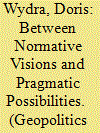

|
|
|
|
|
| Summary/Abstract |
During the last decades the map of Europe has changed considerably. New claims for independent statehood were brought forward and demanded for recognition. These claims had to be answered by the European Union and its member states. This article evolves around the idea that state recognition is as much a matter of politics as it is of law. It starts from the assumption that ‘who we are defines what we see’, claiming, that EUropean identity, the images the EU and the member states hold about themselves, shape the mental maps they hold of territories and space. Building on this identity a geopolitical imaginary is formed, which can be defined as ideas, allowing actors to ascribe meaning to territories, establish order in a seemingly chaotic world by means of classification and categorisation and allow to develop strategies for action. The geopolitical imaginary of EUrope contains the vision, that if all states were more like EUrope itself, the world would be a better place: a world determined not by power and coercion, but by rules, norms and values; with conflict mechanisms, not based on the rule of the strongest, but the rule of law; stability, created through common rules, negotiation and economic prosperity; and a determination not to let ‘blunt power-politics’ prevail. This imaginary shapes the way in which Europe makes meaning of claims for statehood and decides which claims to recognise as legitimate. The different elements of the imaginary sometimes contradict each other: law may have to take the back seat in the quest for stability or justice. Law is open to creative interpretations to allow the ‘right’ claims for recognition to prevail and the ‘wrong’ ones to be rejected The tool of recognition is caught between legal arguments and political considerations, between normative visions and pragmatic possibilities.
|
|
|
|
|
|
|
|
|
|
|
|
|
|
|
|
| 3 |
ID:
171820
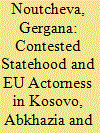

|
|
|
|
|
| Summary/Abstract |
What accounts for the variation in EU actorness in cases of contested statehood in the European Neighbourhood? A comparative analysis of the EU’s policies vis-à-vis three territorial conflicts – Kosovo, Abkhazia and Western Sahara – demonstrates the intricate relationship between external conditions and internal EU capability leading to substantial involvement, partial involvement or non-involvement in conflict management. Using insights from the EU actorness debate and the literatures on contested statehood and EU external governance, the paper offers a conceptualisation of the EU’s conflict management role and a contingent explanation of the EU’s varying commitment to managing conflicts in three cases of contested statehood. The paper finds that external determinants have a considerable weight in EU’s policies which existing research tends to overlook owing to its predominant focus on EU’s internal institutional procedures and instruments. It teases out the external action-enabling and action-hindering factors, in particular the external structural constraints arising from the nature of statehood contestation and the agency of other international and local players in the three conflicts in the European Neighbourhood.
|
|
|
|
|
|
|
|
|
|
|
|
|
|
|
|
| 4 |
ID:
171812


|
|
|
|
|
| Summary/Abstract |
The main purpose of this Special Issue is to interrogate the role of the European Union (EU) as a state-builder in its Near Abroad.1 It aims to make a three-fold contribution to the existing literature. Firstly, it provides working definitions on contested statehood and state-building, paying particular attention to how their properties map onto the EU’s own policy tools and the (diverse) nature of the conflicts with which it seeks to engage. Secondly, it engages with three sets of distinct conceptual literatures that are not often cross-fertilised: (i) the international relations scholarship on contested statehood and state-building; (ii) conceptualisations of EU ‘actorness’ in international affairs; and (iii) the literature on the external dimension of Europeanisation and the use of conditionality as a tool of projecting EU power to partner countries. Thirdly, it borrows from the literature on political geography in order to build an interdisciplinary perspective on EU geopolitical imaginations and the geographical dimensions of the EU’s border expansion and crisis management.
|
|
|
|
|
|
|
|
|
|
|
|
|
|
|
|
| 5 |
ID:
171819


|
|
|
|
|
| Summary/Abstract |
This paper examines the EU Police Mission in the Palestinian Territories (EUPOL COPPS) with a focus on its effects on everyday police work on the ground. The main argument is that the mission illustrates the ways in which its training and advisory activities work to foster logics and practices that feed into and reproduce the borders that have over the years been imposed, primarily through Israeli security practices. Operating under conditions of contested statehood, EUPOL COPPS promotes Palestinian policing activities based on particular spatial logics and actions as to the governance of the Palestinian population. The article presents new empirical material collected through interviews and document analysis. As such, it aims to build bridges between the literature on critical border studies, EU external relations, the EU’s role in the Israeli–Palestinian conflict as well as the literature on the EU police missions in conflict and post-conflict missions by emphasising their spatial dimension.
|
|
|
|
|
|
|
|
|
|
|
|
|
|
|
|
| 6 |
ID:
171815


|
|
|
|
|
| Summary/Abstract |
This article explores the role of the EU in unrecognised, also known as contested, states and more specifically, how their level of international recognition and empirical statehood (i.e. government authority and control) influence the EU’s engagement. By studying the case of the Turkish Republic of Northern Cyprus, the article finds that the EU engagement takes the form of ‘state avoidance’, mostly characterised by an effort to engage without endorsing state recognition and manifested via a) sui generis management of unrecognised borders, b) informal engagement with officials of the unrecognised state, c) replacement of public authorities with non-state actors and d) extensive engagement with civil society. In this regard, the article offers a range of causal explanations that can be tested across a greater number of similar cases. What is more, I contrast state avoidance to state-building approaches evident in aspiring states with more recognition but greater deficit of empirical statehood, such as Kosovo and Palestine, and I argue for a broader conceptualisation of the phenomenon of unrecognised states, allowing for variation in both the degree of recognition and of empirical statehood. As such, the article combines a discussion of rich empirical findings and inductive concept-building that contributes to a more informed discussion and further research development, especially as far as engagement from the EU is concerned.
|
|
|
|
|
|
|
|
|
|
|
|
|
|
|
|
| 7 |
ID:
171816


|
|
|
|
|
| Summary/Abstract |
Ten years after Kosovo’s controversial declaration of independence, this article seeks to analyse how the European Union has gradually become the main external actor in the facilitation of the statebuilding process in Kosovo, how its approach to state-building has evolved in the period 2008-2018 and how the state contestation issue has shaped its actorness in this domain. The empirical analysis shows that while the EU initially adopted a state-building through conditionality approach, modelled on its enlargement policy, after 2008, the EU complemented its conditionality approach with additional tools, which made Kosovo into a key test case for its comprehensive approach to conflicts. Finally, in recent years, the EU has prioritized the normalization of relations with Belgrade in its state-building approach. The analysis also presents some examples of how EU actorness as a state-builder is shaped by the state contestation issue. The lack of recognition of Kosovo by five of its member states induced the EU to devise creative institutional and legal solutions in order to overcome its internal division, but it also strongly reduced its leverage. The lack of effective government induced the EU to make Kosovo become the recipient of the largest amount of EU aid per capita in the world since 1999, but the country’s weak state apparatus constrained the effectiveness of such assistance. Finally, the lack of territorial control over the north by the Pristina-based Kosovo authorities constrained EU actorness because it found implementing its policies impossible or very difficult in that part of the country.
|
|
|
|
|
|
|
|
|
|
|
|
|
|
|
|
| 8 |
ID:
171822
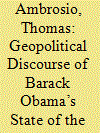

|
|
|
|
|
| Summary/Abstract |
President Barack Obama came to office with the expressed intention of breaking with the geopolitical orientation of his predecessor. Obama argued that George W. Bush overemphasized the Middle East at the expense of the Asia-Pacific region, the war in Afghanistan, rising non-Western states, and domestic affairs. To this end, Obama sought a strategic shift away from the Middle East and toward these other geographic areas. Obama also sought changes to policies which were closely associated with Bush’s focus on the Middle East: counterterrorism, democracy promotion, and foreign military interventions. This article evaluates whether this proposed reorientation away from the Middle East was reflected in Obama’s geopolitical discourse by examining his State of the Union addresses in comparison to those of his predecessor. It finds that these intended changes were largely evident in these speeches in that they exhibited a far greater geographic diversity than Bush’s, reflected adjustments to these policies, and paid substantially more attention to domestic affairs. However, this shift was limited by external events and the Middle East continued to command Obama’s primary focus. These findings reinforce the notion that while leaders seek to shape geopolitical understandings through their discourse, this discourse is in turn restricted by global realities.
|
|
|
|
|
|
|
|
|
|
|
|
|
|
|
|
| 9 |
ID:
171821


|
|
|
|
|
| Summary/Abstract |
This Special Issue of Geopolitics on state building and contested statehood comes at an apposite time. As Bouris and Papadimitriou note in their introduction, a range of EU state building tools and frameworks in the Union’s near abroad are now evident, including the Neighbourhood Policy, development of the Common Security and Defence Policy, and conditionality-related effects of Europeanization. All have experienced some form of political contestation. Moreover, profound questions now face the six-decade old project of European political integration as it confronts a surge in populist nationalism among its (currently) twenty-eight member states. This has left the process of European statebuilding in flux, buffeted by competing supranational, national and subnational political imperatives and often divisive EUropean popular imaginaries.
|
|
|
|
|
|
|
|
|
|
|
|
|
|
|
|
| 10 |
ID:
171818


|
|
|
|
|
| Summary/Abstract |
This article examines whether contested statehood represents a hindering condition for EU actorness in Georgia, a country where the EU has had ample opportunities to engage with contested territories. It focuses on EU engagement in Georgia in three policy areas – conflict management, migration and mobility, and trade – where the implications of divergent conceptions of sovereignty, legitimate authority and territoriality are most salient. The article argues that the EU has gone to great lengths in adjusting its frameworks and their practical implementation to accommodate Georgia’s ‘problematic sovereignty’ by adopting a flexible approach: conflict management policies explicitly include the unrecognised territories of Abkhazia and South Ossetia; migration and mobility instruments omit any reference to Georgia’s contested statehood, implying the two entities’ default inclusion in visa liberalisation; and trade explicitly excludes them from the DCFTA, unless the Georgian government can ensure full enforcement in these territories. Regardless of the EU’s attempt at flexibility, the irreconcilable interests of the conflict parties, together with the EU’s privileging of international legal recognition, has resulted in a fractured record of EU actorness: strong actorness towards the 80% of Tbilisi-controlled territory, and low actorness towards the two unrecognised entities.
|
|
|
|
|
|
|
|
|
|
|
|
|
|
|
|
| 11 |
ID:
171813


|
|
|
|
|
| Summary/Abstract |
This article provides a poststructuralist analysis of the interplay among the EU’s three temporal selves, elucidating how the ideal representations of the EU’s past and future selves legitimize its statebuilding activities, particularly in cases of contested statehood in its neighbourhood, and reproduce the ideal European self today. The major argument of the article is that the discourse of “successful peaceful European integration” (employed to construct the EU’s past self) and the discourse on “the EU’s normative aspirations about state-/peace building” (employed to construct its future self) help constitute its present identity “as representing peace” – and, thus, as ideal – and legitimize its statebuilding practices. The article takes the ideal constructions of the EU’s past, present and future selves as spatio-temporal practices because they serve the continuous production and reproduction of the boundaries between a peaceful Europe and its conflictual others, which primarily refers to a geographical/geopolitical othering exercise.
|
|
|
|
|
|
|
|
|
|
|
|
|
|
|
|
| 12 |
ID:
171824
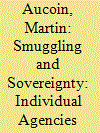

|
|
|
|
|
| Summary/Abstract |
Coverage of ‘Borderland Schengen’ and the European immigration ‘crisis’ continues to produce ‘irregular’ migrants through visual-political processes not only as threats to stability and cohesion in Europe, but as threats to the notion of state sovereignty (Kühnemund 2018). This rhetoric of crisis relies on older models of human smuggling networks in which these networks are characterized as hierarchical ‘businesses’ that threaten to subvert states’ monopolies over human movement through coordinated, organized actions (Baird 2016). Governments and smuggling networks are, however, made up of individuals whose actions constitute the ‘everyday practices’ (Ashutosh and Mountz 2012) and the ‘street level’ policy-making (Lipsky 2010) of the organizations they comprise. The positioning of these individuals within their organizational terrain, or what Pierre Bourdieu defines as the ‘bureaucratic field’ (Bourdieu, Wacquant, and Farage 1994), influences how these everyday practices are carried out. Because of the lack of a homogenous body of practice within these organizations, the ways in which the agents of both networks interact with each other at and across Europe’s borders may differ considerably from their representation in news media and public discourse.
|
|
|
|
|
|
|
|
|
|
|
|
|
|
|
|
| 13 |
ID:
171823
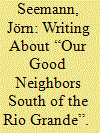

|
|
|
|
|
| Summary/Abstract |
President Franklin Roosevelt’s Good Neighbor Policy emerged as a non-aggressive form of cultural diplomacy and emphasized mutual understanding among the nations in the Western Hemisphere through a substantial diffusion of books, music and movies. Though Roosevelt’s foreign policy has been widely discussed in general terms, there is still a lack of studies on the cultural-geographic dimension of this initiative, especially on the production of geographic images and stereotypes. The aim of this paper is to present an analysis of a popular picture book series (Pictured Geography) from the 1940s that introduces, depicts and describes Latin American countries for the broader public in the United States. The reading between the lines of the stories and pictures reveals a moral geography of the region from an American viewpoint and opens up a debate on the impacts of images and discourse on the shaping of worldviews and understanding of different cultures.
|
|
|
|
|
|
|
|
|
|
|
|
|
|
|
|
|
|
|
|
|